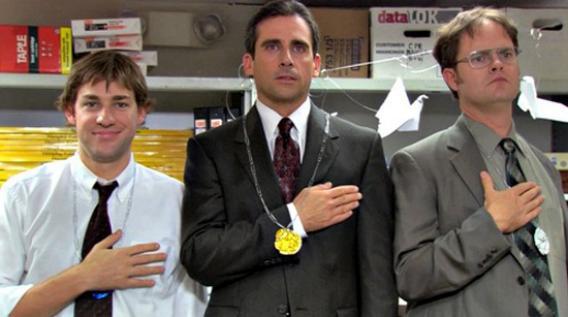Summer is here, the perfect time to catch up with a few of those shows everyone is always saying you should watch. But there are so many! How can you decide which to try? You need to find the gateway episode, one you can watch without any background knowledge and which will give you a real sense of the show—and whether you’ll like it.
When, a couple months ago, Pam Beesly Halpert (Jenna Fischer) offered her final line, and the camera cut to the office building where she had spent so much of her working life, I didn’t just cry: I sobbed.
I confess this slightly embarrassing response as someone who became a fan of The Office only recently—last summer, to be precise. As I zipped through nine seasons of the show, I grew to love the characters and their stories. Now I feel like an evangelist, wanting to make sure that anyone who gave the NBC series a pass during its run finally catches up with it now that it’s over.
But where to start?
Not with the first season, that’s for sure: The Office really only distinguished itself as a show about the American workplace—rather than a by-the-book adaptation of the British original—after working out a few kinks in its initial go-round. So start with Season 2, and specifically the third episode, “Office Olympics,” which is referenced in the finale—for good reason. It contains all the elements that make The Office one of the best American sitcoms ever.
Spoilers follow (but come on, it’s a sitcom).
The episode opens with Michael Scott (Steve Carell), a regional manager for the Dunder Mifflin paper company, poised to become a first-time homeowner. His assistant Dwight (Rainn Wilson) offers to accompany him to sign the contract. But, much to the chagrin of Michael’s real-estate agent, Carol (Nancy Wall, Carell’s wife), the overbearing Dwight gets in impressionable Michael’s head. As Michael grows more and more daunted by the prospect of a 30-year mortgage, he masks his anxiety in typical Michael fashion, making excuses to back out of the deal—such as the lack of “attractive singles” in the neighborhood. “There’s a basic principle in real estate, that you should never be the best-looking person in the development,” he says.
For someone with an excessive (and even aggressive) desire to please the boss and be his “No. 2 guy,” Dwight is unfailingly superior. When Michael magnanimously offers to rent him a room in his new condo—to counterbalance what he just spent—Dwight underhandedly forces Michael to rescind the offer by being purposely demanding. (Afterward, he reveals to the audience that he owns a 60-acre beet farm, and would never consider living anywhere else.)
Meanwhile, back at the office, Jim surveys other Dunder Mifflin staffers to see if they, too, are dying of boredom on the job. And this is the series’ fundamental theme: The Office is, at its core, an ode to the monotony of office life. What’s underneath the accountant’s expense reports? The scoreboard for Hateball, a paper football game that Kevin (Brian Baumgartner) and Oscar (Oscar Nunez) have been playing for years. What are those mysterious noises coming from the Customer Service and Human Resources bullpen in the back? A game of Dunderball, which consists of bouncing a ball against the wall over the cubicles’ divider.
These games not only testify to everyone’s boredom, they also give viewers a feel for the personalities of the Dunder Mifflin employees. This is another hallmark of The Office: the way supporting characters like Kevin or Phyllis (Phyllis Smith) delight and dazzle even in episodes where they only get a few seconds of screen time.
Inspired by these games, our hero Jim sets up the Dunder Mifflin Olympics. Pam helps him out by making gold, silver, and bronze medals out of paper clips and yogurt caps. “The thing about Jim is, when he’s excited about something, like the Office Olympics, he gets really into it and he does a really great job,” Pam tells the off-screen documentary team. (The Office is, like many recent sitcoms, a mockumentary.) “But the problem with Jim is that he works here, so that hardly ever happens.”
Ever the killjoy, Angela (Angela Kinsey) rebuffs Pam’s invitation to join in the games, in the process highlighting the romantic tension between Jim and Pam, which is the emotional heart of the show. The only game she plays in the office, Angela tells Pam, is Pam Pong. “I count how many times Jim gets up from his desk and goes to reception to talk to you.” Pam’s blush speaks volumes.
The games end abruptly when Michael returns to the office. But as the episode comes to a close, Jim retrieves a downcast Michael from his office, inviting him to the closing ceremonies. Jim gives him the gold medal in honor of his new condo, and positions him atop a big box of fax paper. As the “Star Spangled Banner” plays, Pam sets off a line of paper doves, and Michael tears up—just like you probably will if you stick with this show to the end.
Previous Gateway Episodes
Bunheads
South Park
Happy Endings
The X-Files
The Sopranos
Gilmore Girls
Veronica Mars
Deadwood
Doctor Who
Buffy the Vampire Slayer
